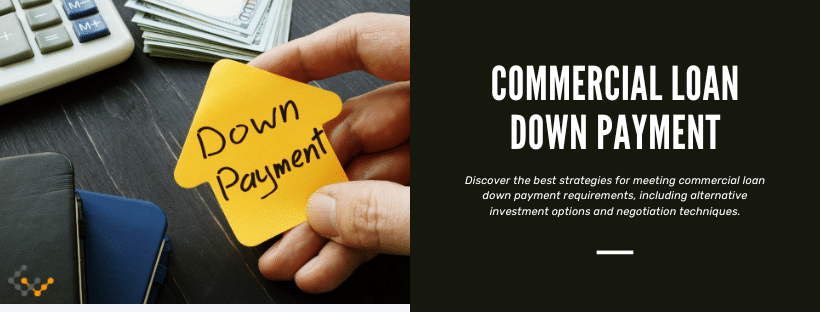What is the Minimum Commercial Loan Down Payment?

One of the most important details of any commercial loan application is the down payment. Most investors seek to put the minimum amount down for a loan to maximize potential returns through leverage and more easily manage monthly cash flows. If you’re in the process of making an offer or securing financing, here’s what the minimum commercial loan down payment generally is.
How Do You Qualify for a Commercial Loan?
Any loan application is approved or denied based on multiple data points. When evaluating loan applications, lenders consider factors such as credit score, business history, cash flow, and collateral. While exact requirements vary depending on lender and loan program, you should aim for the following:
Answer a few questions and get custom mortgage quotes. We'll match you with offers from our network of 650+ lenders.
- Credit Score: Aim for a credit score of ~660 or above (680 for some lenders). While you might secure a commercial real estate loan with a lower credit score, your choices will be limited and not as good. A credit score above 680 is usually required to secure favorable loan terms.
- Business History: Lenders prefer businesses with a successful and stable track record, typically showing at least two years of profitable operations. This doesn’t mean that new and struggling businesses are complete without options, though, especially if you have good credit and will serve as a personal guarantor.
- Cash Flow: Your business should generate enough cash flow to cover the loan payments and other expenses. Lenders are less flexible on this requirement than some of the others.
- Collateral: The property being financed serves as the collateral for your commercial real estate loan. However, because it’s a major factor, the property dictates what loan programs you can qualify for. This is especially true if you use a specialized loan program.
The process differs from securing a home mortgage (as are the requirements), but a lender or CommLoan loan consultant will guide you through the steps once you reach out to them.
What Type of Commercial Loan is For You?
There are many different types of commercial real estate loans. Some have very general requirements, while others are highly specialized for certain types of businesses or properties. The more common types of commercial loans are:
- Traditional Commercial Mortgage Loans: Offered by banks and credit unions, which typically have lower interest rates but more stringent qualification requirements. A good choice for borrowers with established banking relationships, a strong credit history, business experience, and a property that doesn’t meet the criteria for specialized loan programs.
- SBA 7(a) Loans: The Small Business Administration (SBA) guarantees a portion of these loans, making them more accessible to small businesses that might not qualify for traditional bank loans. SBA 7(a) loans are available to most small businesses that need financing for working capital, equipment purchases or real estate.
- SBA 504 Loans: Also backed by the SBA, the SBA 504 loan program makes financing available for the purchase of commercial real estate or long-term equipment. Small businesses looking to expand or modernize their facilities should consider this program.
- Line of Credit: A commercial line of credit allows business owners to borrow against their property’s equity. This type of loan is suitable for those who already have substantial equity in a building, and want access to funds as needed. The funds can be used for diverse business purposes, such as managing cash flow or funding short-term expenses.
- Portfolio Loans: Extend financing across multiple properties or locations, usually ones that a business itself uses (e.g. stores, factories or restaurants). The loans finance two or more properties together.
- Commercial Hard Money Loans: These loans are short-term, asset-based loans offered by private lenders. They have higher interest rates and are typically used for time-sensitive projects or when traditional financing is not an option. Hard money loans are suitable for borrowers who need quick access to funds, have less-than-stellar credit, or are dealing with unique or distressed properties.
Requirements to Get a Commercial Loan
To secure a commercial loan, borrowers need to meet specific requirements, including:
- Down Payment: Amount paid by the borrower at the time of purchase. Most commercial loan minimum down payments require 20-25% down, but some programs and types differ.
- LTV Ratio: Compares the loan amount to the appraised value of the property. Loans often require a loan to value ratio of 65% to 80%, but some specialized programs allow for up to ~90%.
- DSCR: Measures the business’s ability to cover loan payments with its cash flow. Lenders typically want a debt service coverage ratio of 1.2 or higher, but some programs again may vary.
How Much Down Payment is Needed for a Commercial Loan?
The down payment required for a commercial loan depends on the type of loan and the lender’s requirements. Most commercial loans require a down payment ranging from 20% to 25% of the property’s purchase price. Some go as low as 10% and some as high as 30%, though. (There can be outliers beyond this range.)
The minimum amount down for a commercial property is largely dictated by the type of loan:
- Bank loans typically require a down payment of 20% to 30%.
- SBA 7(a) loans require a down payment of 10% to 20%.
- SBA 504 loans require a down payment of 10% to 15%.
- Hard money loans typically require a down payment of 20-30%.
- Lines of credit typically require a minimum equity of 20-30%.
The SBA loan down payment requirements are some of the lowest among all loan programs.
Factors Affecting Down Payment Requirements
Several factors can affect the down payment requirements for a commercial loan, including:
- Credit Score: Borrowers with higher credit scores may qualify for lower down payment requirements.
- Type of Property: The property type, such as office buildings, retail spaces, or industrial facilities, can influence the down payment requirement.
- Loan Size: Larger loans may require higher down payments to mitigate the lender’s risk.
- Industry: Businesses in industries perceived as riskier may face higher down payment requirements.
There are still more factors that impact what business loan down payment is needed for a property.
Strategies to Lower Your Down Payment
If you’re concerned about meeting the down payment requirements for a commercial loan, consider these strategies to lower your initial investment:
- Improve your credit score by paying down existing debt, making on-time payments, and reviewing your credit report for errors to boost your credit score. Also avoid applying for other financing at this time.
- Propose offering additional collateral against the loan, which may be a permissible substitute for some of a down payment.
- Seek a loan guarantee from an investor, the SBA or another suitable party. You can guarantee the loan yourself if your personal credit and assets are sufficient.
- Partner with investors who can contribute capital to the purchase of your target property.
- Explore other lenders and loan programs to see if there’s an option with a lower down payment requirement.
How to Choose a Commercial Real Estate Lender
The best lender will have a down payment requirement you can meet, while offering other advantageous terms within their financing. Here are some tips to help you choose the right lender:
- Evaluate Yourself: Before approaching lenders, assess your financial health, credit score, and business history. This will help you determine which loan options are the best fit for your needs.
- Compare Lenders/Loans: Don’t limit yourself to just one lender, but compare offers from multiple lenders to find the best terms and rates. Also compare loan programs if your purchase qualifies for multiple ones.
- Seek Recommendations: Speak with other business owners and professionals in your industry to gather recommendations for reputable lenders. Online reviews are also helpful.
- Use a Broker: A commercial loan broker can help you compare loan offerings from multiple lenders. The broker can also recommend the best loan program for your property and situation.
Wrapping Things Up
The minimum down payment for a commercial loan varies depending on the loan type and lender’s requirements, but be prepared for 20-25% in most cases. Don’t forget to shop around when looking for a commercial loan, as down payment requirements and other terms differ between lenders and loan programs.

